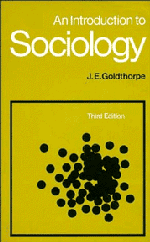Author's preface to the third edition
Published online by Cambridge University Press: 05 July 2011
Summary
I was honoured and delighted when in 1964 the Syndics of the Cambridge University Press asked me to write a textbook of sociology specially for students in the universities of Africa. Although there is no lack of introductions to sociology, most are written for students living in Europe and America and unfamiliar with the societies of the developing countries. The Syndics' far-sighted perception at that time of the need for a book written, so to speak, the other way round – beginning with the perspectives of an emergent Africa and leading on to a wider reality, including that of the affluent industrial societies – has been abundantly justified, to such an extent that there is now a need for a third edition.
In it, the text has been extensively revised to take account of the changing relations between men and women. The argument about social change has been strengthened by reference to the work of Norbert Elias. The passages on the care of children and on the household have been re-written in the light of the researches and debates of the 1970s. The treatment of social class and social mobility in industrial societies has been revised in view of recent research, especially the findings of the Oxford social mobility survey and the work of the author's namesake John H. Goldthorpe; while the succeeding passages on socialism have been reconsidered and, I hope, clarified, in no small part as a result of discussions with colleagues at the University of Leeds.
- Type
- Chapter
- Information
- An Introduction to Sociology , pp. vii - viiiPublisher: Cambridge University PressPrint publication year: 1985

